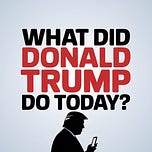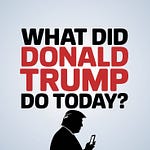Donald Trump’s recent press gaggle aboard Air Force One exemplified his improvisational, self-promoting approach to governance. He opened with a pitch for a “Trump Card Gold Card,” then rambled through topics like the economy, foreign policy, and golf without structure or factual grounding. His economic claims were exaggerated and lacked substance, touting “trillions” in investment and praising tariffs as leverage while ignoring their costs. Foreign policy remarks were similarly hollow, crediting himself with hostage releases and progress on Ukraine, again without evidence. Domestically, Trump admitted firing staff over loyalty concerns and confirmed far-right activist Laura Loomer’s influence on appointments, reflecting an administration prioritizing obedience over expertise. His blending of business with state matters—referencing Trump golf courses and the LIV-PGA merger—further blurred ethical lines.
His sweeping new tariffs—10% across the board, up to 54% on key partners—have triggered global backlash, market instability, and threats of retaliation, especially from the EU and China. Allies like Canada and Japan voiced concern, and automakers announced layoffs. The administration defends the tariffs as correcting “unfair trade,” but economists warn of rising costs and inflation. The strategy appears more ideological than strategic, damaging alliances and threatening economic stability ahead of the April 9 rollout.
Vice President JD Vance, meanwhile, delivered a combative Fox & Friends interview steeped in populist rhetoric but devoid of policy coherence. He pushed dubious economic claims about tariffs, floated authoritarian immigration proposals, and glorified Elon Musk’s informal government role. His tone suggested self-promotion for 2028, not serious governance. Press Secretary Karoline Leavitt echoed this performative style, defending tariffs with misleading stats and bombastic language while dodging economic realities and trade diplomacy questions.
In a troubling personnel move, Trump fired three NSC officials after a meeting with Loomer, signaling a purge based on loyalty. The firings, opposed by some inside the administration, highlight growing dysfunction and the erosion of national security norms. Separately, the Department of Education threatened to cut Title I funds to schools with DEI programs, leveraging civil rights laws to push a cultural agenda—potentially harming low-income students.
In the courts, Trump lost a UK lawsuit against Orbis Business Intelligence over the Steele dossier and was ordered to pay $823,000 in legal fees, reinforcing his struggles with credibility and mounting legal defeats abroad. Domestically, a D.C. Circuit ruling allowed his administration’s push to dismantle the CFPB to proceed procedurally, setting the stage for a constitutional showdown over executive overreach. Meanwhile, the Pentagon is reviewing Defense Secretary Pete Hegseth’s use of Signal to plan classified strikes—raising serious concerns about security breaches involving top officials like Vance and National Security Adviser Mike Waltz.
Finally, Dr. Mehmet Oz was narrowly confirmed to lead CMS despite widespread concerns over his history of promoting pseudoscience. His appointment—like much of Trump’s second-term leadership—signals a continued prioritization of brand, loyalty, and media celebrity over competence and institutional integrity.













Share this post